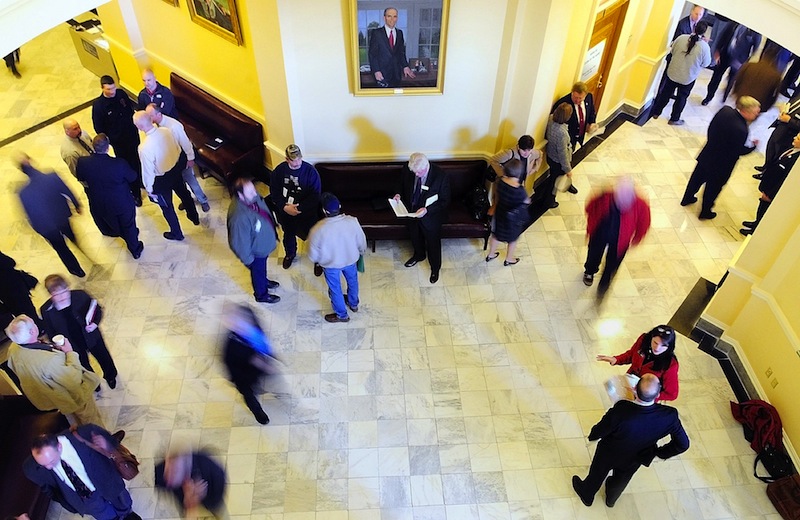AUGUSTA – The Legislature’s budget-writing committee made progress on an emergency spending plan Thursday but adjourned late in the day as they worked to fix a $153 million shortfall caused largely by Medicaid overruns and low revenue collection.
Before then, rifts developed between Democrats and Republicans on proposals by Gov. Paul LePage involving charter school funding and an annual cap on General Assistance aid for cities and towns.
Neither initiative offers appreciable savings related to the proposed budget, but both represent a battle of principles between the parties.
Lawmakers were hopeful that both issues could be resolved as the Appropriations Committee worked to endorse a budget proposal unanimously.
A unanimous committee vote would improve the chances for the two-thirds majorities needed in the House and Senate to enact the emergency budget and override a veto, which LePage has said he will use if charter school funding is cut by legislators.
In all, the LePage administration has proposed more than $153.2 million in adjustments to balance the budget for the fiscal year that ends June 30. The Legislature can make changes to LePage’s proposals, but it must hit that number to balance the budget.
Within that, nearly $118 million is for the Department of Health and Human Services, which overran projected costs for MaineCare, Maine’s Medicaid program, by nearly $88 million.
DHHS spokesman John Martins said $33 million in MaineCare overruns were due to changes made to MaineCare that were rejected by the federal government.
That includes nearly $15 million that would have been saved by making childless adults and 19- and 20-year-olds ineligible for MaineCare. Nearly $6 million would have been saved by removing parents who were just at, or 33 percent above, the federal poverty level — $23,550 for a four-person family this year, according to the federal data.
Republicans have cited the MaineCare gap as showing the need for structural reform, while Democrats have blamed it mostly on Republican initiatives.
“I think it’s important to remember how we got here,” House Speaker Mark Eves, D-North Berwick, said Wednesday. “It’s because of the savings initiatives that weren’t achieved over the last two years. We’re here cleaning up the mess of the Republican-led budget.”
LePage proposed mostly one-time fixes, including a $40 million withdrawal from the Budget Stabilization Fund, also referred to as the rainy day fund.
He also proposed using $18.5 million from a two-week deferral of aid to schools, $17.1 million from a capital fund and $14 million in casino revenue that was earmarked for education.
LePage also proposed capping General Assistance for municipalities at $10.1 million in this fiscal year. If past numbers are any indication, Maine would hit that ceiling.
Nicholas Adolphsen, director of legislative affairs for DHHS, has said that in the last fiscal year, the state spent $11.6 million on General Assistance.
At a hearing in January, a DHHS official said the state would have spent $6.1 million on the program in this fiscal year, with slightly less than six months to go.
The LePage administration wants to continue that cap into the next two-year budget, projecting it would save $6.7 million over that period. After that, the state would stop reimbursing municipalities, which would have to choose whether to fund the program.
The supplemental budget plan also must address a $35.5 million gap in the state’s General Fund budget, announced in December by the LePage administration, which cited bleaker-than-expected December revenue projections.
About $28.5 million of those cuts would hit the DHHS, schools and the University of Maine System.
Within the nearly $12.6 million targeted toward K-12 schools, charter schools, which LePage has championed, were spared.
Democrats on the Education Committee opposed that, and included the state’s two operating charter schools — Cornville Regional Charter School and the Maine Academy of Natural Science at Good Will-Hinckley — in a small round of cuts.
In November, the Morning Sentinel reported that a total of 107 students went to the two schools, and while the Hinckley school drew students — and by extension money — from 27 districts, the Cornville school drew from five.
The committee’s decision drew the ire of LePage, Stephen Bowen and Sawin Millett, the governor’s education and finance commissioners.
LePage said it was “a failure to put our students first,” and Bowen said Democrats “want charter schools to fail.”
Millett dubbed the decision “an inequitable overreach” that is “fiscally inconsequential” to the budget process.
The Appropriations Committee has already made some changes to the governor’s proposal. The panel has unanimously endorsed a measure to restore $700,000 to the state’s adoption subsidy program.
Still under consideration are proposals to eliminate the state’s Drugs for the Elderly Program, as well as a $1.7 million cut in mental health services and $4.2 million for state-funded adoption and foster care services.
Michael Shepherd can be contacted at 370-7652 or at:
mshepherd@mainetoday.com
Steve Mistler can be contacted at 620-7016 or at:
smistler@pressherald.com
On Twitter: @stevemistler
Send questions/comments to the editors.


